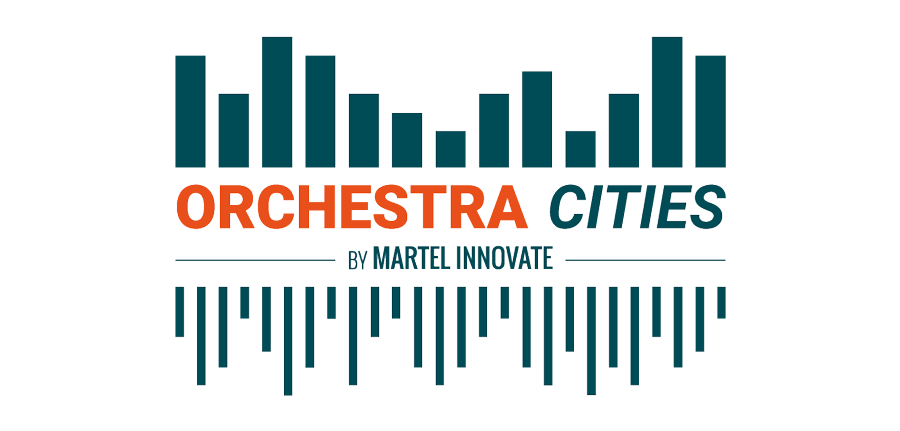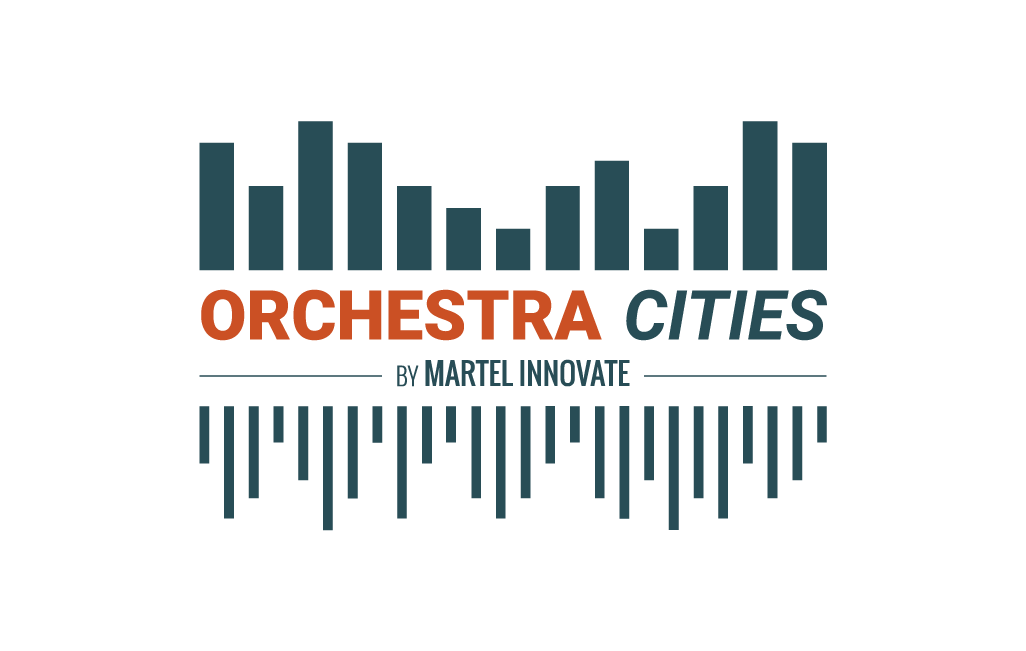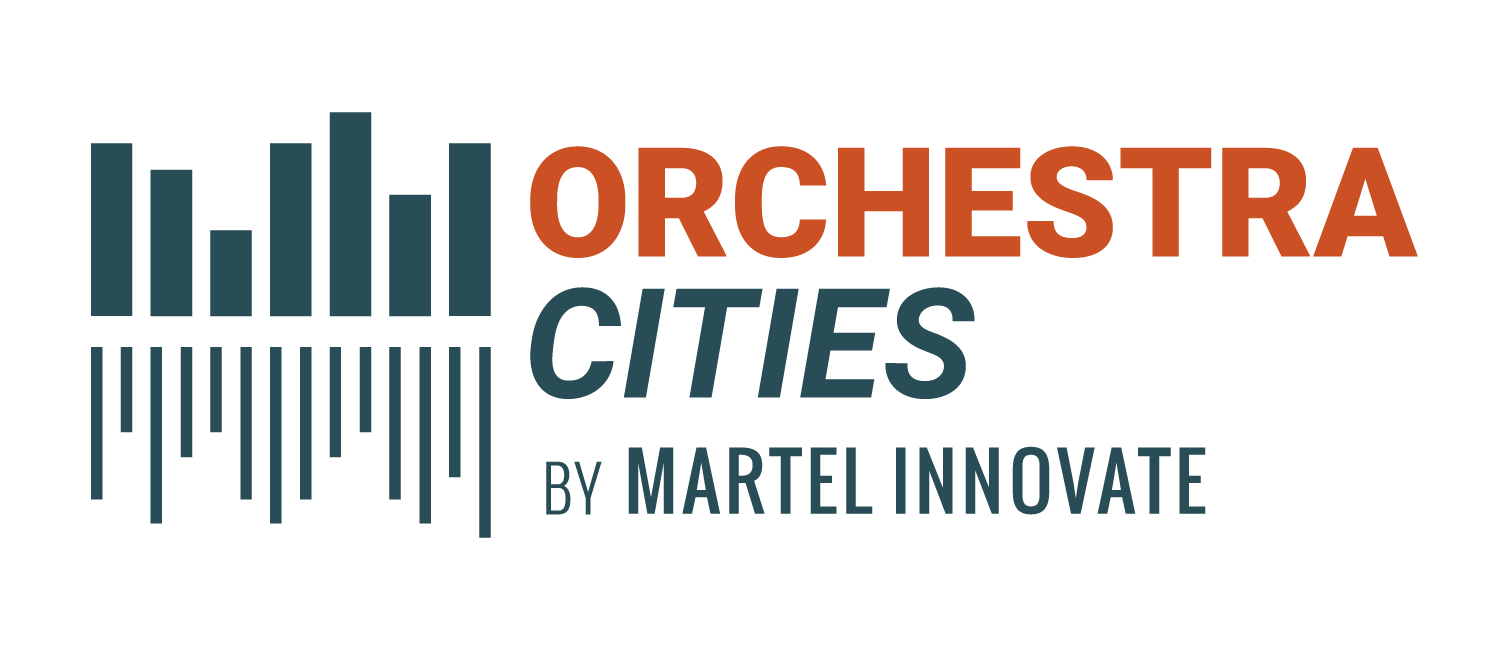Today’s cities operate in challenging times. Faced with ever-growing populations, insufficient and aging infrastructure, quickly growing and evolving needs of residents, and budget constraints, they are looking for efficient and sustainable solutions to existing and emerging challenges. For this reason, for quite some time now, cities around the world are reinventing themselves through smart city services and initiatives. The outbreak of COVID-19 only further intensified these efforts.
Cities are starting to realize that developing and incorporating even the most innovative solutions will not be enough if they do not promote cooperation and data-sharing on a large scale. However, as this type of technology-led innovation depends on access to data from a wide variety of sources, questions and doubts regarding data privacy and ownership arise.

Orchestra Cities platform
Launched in 2018 by Swiss-based Martel Innovate, Orchestra Cities is an open and collaborative platform that facilitates the development, sharing, and monitoring of smart city services between municipalities. The solution is data and IoT-driven and follows the principles of open source code and open application programming interface (API) access. “The three dimensions of openness that we advocate and practice with Orchestra Cities are key enablers for the adoption and success of human-centric Smart Cities. Open standards ensure interoperability and level the playing field, while open APIs create an ecosystem where no provider can terminate the value chain just to extract rent from it. Finally, access to open data compounds and amplifies the reach of the information the city gathers from its sensors,” said Dr. Monique Calisti, Martel Innovate’s CEO, highlighting the core approach and values underpinning Orchestra Cities.
Services offered by Orchestra Cities include but are not limited to environmental air quality monitoring, security, street lighting control, traffic and parking management, and intelligent waste collection. The solution has already been tested and validated by the municipalities of Antwerp, Belgium (reducing traffic congestion in the city by enabling intelligent decision-making based on different data available from sensors and services) and Helsinki, Finland (monitoring of prediabetes patients through GDPR compliant management of Smart Homes). The platform is currently being adopted by Wolfsburg, Germany and the EKZ multi-utility provider in the Swiss Canton of Zurich.
How Orchestra Cities uses data
Orchestra Cities has been developed and designed to facilitate the collaborative management of data and services by different cities and different stakeholders within the cities, allowing for the integration, analysis, and visualization of data from sensors, legacy systems, citizen data, among other sources. The platform offers a powerful set of functionalities:
- Flexible dashboard co-creation, including maps, graphs, and easy sharing.
- Integrated management of Orchestra Cities APIs and third parties’ APIs, with flexible access policies and fault-tolerance mechanisms.
- Data management based on open standards, supporting both real-time and historical data.
- Support for centralized management of IoT that facilitates the integration of live data from IoT sensors, devices, and other sources.
- Advanced data privacy control mechanisms, ensuring that the data owner is always in control of the data injected.
- A visual data ingestion service that allows for the design of data pipelines to populate the platform with data from services, files, etc.
The core of Orchestra Cities data management is a “data bus” collecting data from multiple sources and forwarding them to the different backend APIs based on the specific scenarios. This “data bus” is provided by Context Broker, a core subsystem of FIWARE software infrastructure, compliant with the standard data representations NGSI v2 and NGSI-LD and recognized and adopted by the Connecting Europe Facility (CEF) initiative. All data used in the platform transit through it, i.e., IoT devices data, external services data, and platform generated data.
Multiple interaction modes between the Context Broker and other Orchestra Cities services provide a very flexible way to integrate data providing (e.g., sensors) and data processing services (e.g., analytics). The other data management core component is the Timeseries API that stores all historical data of a given entity (the Context Broker stores only the current value in time of a data point). The Timeseries API is provided by Quantum Leap, a FIWARE GE developed by Martel Innovate that graduated as an official FIWARE core component and is the only Historical Context API available (as of today) that supports both NGSI v2 and NGSI-LD. The Timeseries API allows to store both short-term raw data (e.g., all the raw data received in the last month) and consolidated long-term data (e.g., the result of data aggregation to provide uniform data for analytics and other processing).
Dr. Giovanni Rimassa, Martel Innovate’s Chief Innovation Officer emphasizes that “data protection and privacy are of utmost importance to Martel Innovate, which is reflected in the core choices that were made for the platform,” that is:
- All personal and sensitive data are managed according to the GDPR and other European norms that apply.
- Orchestra Cities provides a Cloud-native, multitenant environment where each city can choose which data to keep restricted and which ones to exchange with their neighbors.
- Access to the configuration of Devices and Sensors is based on Groups and Roles. This means that “Streetlight Department” will have access only to “Streetlight” devices and that depending on their role in the “Streetlight Department”, users will be able to read data and configuration or change the device configuration. The same applies to “clients”, i.e., services accessing Devices and Sensors.
- The access to APIs, and hence data stored in the Platform, is controlled by a common policy enforcement point. Data owners of different contextual data define who can access a resource, which operation can be performed, and the resource (or set of resources) in scope.
For more information about the platform, please refer to Orchestra Cities’ brochure.
References
- FIWARE Foundation: https://www.fiware.org/
- Orion Context Broker: https://ec.europa.eu/cefdigital/wiki/display/CEFDIGITAL/Orion+Context+Broker
- NGSI v2 and NGSI-LD data representations:
https://swagger.lab.fiware.org/?url=https://raw.githubusercontent.com/Fiware/specifications/master/OpenAPI/ngsiv2/ngsiv2-openapi.json#/
https://swagger.lab.fiware.org/?url=https://raw.githubusercontent.com/FIWARE/specifications/master/OpenAPI/ngsi-ld/full_api.json
https://fiware-datamodels.readthedocs.io/en/latest/ngsi-ld_howto/index.html - CEF: https://ec.europa.eu/cefdigital/wiki/display/CEFDIGITAL/CEF+Digital+Home
- Context Broker adopted in CEF: https://www.fiware.org/2018/08/08/fiware-context-broker-launches-as-a-cef-building-block/





